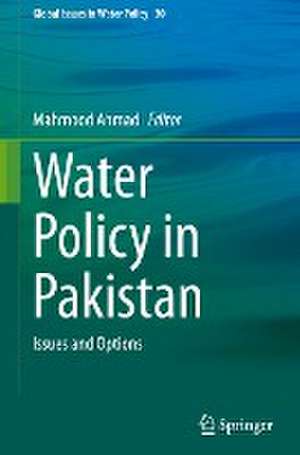Water Policy in Pakistan: Issues and Options: Global Issues in Water Policy, cartea 30
Editat de Mahmood Ahmaden Limba Engleză Hardback – 27 sep 2023
Din seria Global Issues in Water Policy
- 18%
 Preț: 956.81 lei
Preț: 956.81 lei - 15%
 Preț: 645.96 lei
Preț: 645.96 lei - 18%
 Preț: 966.27 lei
Preț: 966.27 lei - 15%
 Preț: 649.87 lei
Preț: 649.87 lei - 24%
 Preț: 639.68 lei
Preț: 639.68 lei - 20%
 Preț: 574.08 lei
Preț: 574.08 lei - 19%
 Preț: 519.80 lei
Preț: 519.80 lei - 18%
 Preț: 786.36 lei
Preț: 786.36 lei -
 Preț: 432.12 lei
Preț: 432.12 lei - 15%
 Preț: 649.06 lei
Preț: 649.06 lei - 15%
 Preț: 635.15 lei
Preț: 635.15 lei -
 Preț: 395.09 lei
Preț: 395.09 lei - 18%
 Preț: 953.65 lei
Preț: 953.65 lei - 20%
 Preț: 595.16 lei
Preț: 595.16 lei - 15%
 Preț: 664.61 lei
Preț: 664.61 lei - 15%
 Preț: 643.84 lei
Preț: 643.84 lei - 24%
 Preț: 820.64 lei
Preț: 820.64 lei - 18%
 Preț: 945.14 lei
Preț: 945.14 lei - 24%
 Preț: 800.73 lei
Preț: 800.73 lei - 24%
 Preț: 685.91 lei
Preț: 685.91 lei - 19%
 Preț: 555.11 lei
Preț: 555.11 lei - 23%
 Preț: 806.95 lei
Preț: 806.95 lei - 24%
 Preț: 698.16 lei
Preț: 698.16 lei - 15%
 Preț: 635.96 lei
Preț: 635.96 lei - 18%
 Preț: 956.03 lei
Preț: 956.03 lei - 18%
 Preț: 963.91 lei
Preț: 963.91 lei - 15%
 Preț: 642.18 lei
Preț: 642.18 lei - 18%
 Preț: 960.30 lei
Preț: 960.30 lei
Preț: 959.82 lei
Preț vechi: 1170.51 lei
-18% Nou
Puncte Express: 1440
Preț estimativ în valută:
183.69€ • 191.27$ • 155.24£
183.69€ • 191.27$ • 155.24£
Carte tipărită la comandă
Livrare economică 10-24 martie
Preluare comenzi: 021 569.72.76
Specificații
ISBN-13: 9783031361302
ISBN-10: 303136130X
Ilustrații: XXX, 457 p. 1 illus.
Dimensiuni: 155 x 235 mm
Greutate: 0.86 kg
Ediția:1st ed. 2023
Editura: Springer International Publishing
Colecția Springer
Seria Global Issues in Water Policy
Locul publicării:Cham, Switzerland
ISBN-10: 303136130X
Ilustrații: XXX, 457 p. 1 illus.
Dimensiuni: 155 x 235 mm
Greutate: 0.86 kg
Ediția:1st ed. 2023
Editura: Springer International Publishing
Colecția Springer
Seria Global Issues in Water Policy
Locul publicării:Cham, Switzerland
Cuprins
Part 1: Background and Setting.- Chapter 1. Introduction (Simi Kamal).- Chapter 2: Water Resource Potential: Status and Overview (Mohsin Hafeez and Muhammad Arshad).- Chapter 3: Water Supply and Demand: National and Regional Trends (Shahid Ahmad and Ghufran Ahmad).- Chapter 4: Water Infrastructure and Institutional Setting (from Chapter 8) (Muhammad Arshad and Fahad Amjad).- Chapter 5:Political Economy of Water (Erum Sattar).- Part 2. Sectoral Specific Issues.- Chapter 6: Water and Agriculture – a major area of water policy reforms (Kalim Qamar, Robina Wahaj, Asif Sharif and Mahmood Ahmad).- Chapter 7: Drinking Water Supply and Sanitation (Naseer Ahmad, and Mitsuo Yoshida).- Chapter 8: Water Storage and Hydropower (Daud Ahmad and Aslam Rasheed).- Part 3. Sector-wide Issues.- Chapter 9: Water Pricing, Demand Management, and Allocative Efficiency (Mahmood Ahmad and Ahsan Tayyab).- Chapter 10: Groundwater Overexploitation and Water Mismanagement (Sanval Nasim).- Chapter 11: Water Quality and Salinity (Muhammad Abid Bodla, Mohammad Ashraf and Vaqar Zakaria).- Part 4. Regional. International and Future Issues.- Chapter 12: Wastewater treatment in Pakistan: Issue, challenges and solution (Fozia Parveen, and Sher Jamal Khan).- Chapter 13: Water Treaties: National and international (Azeem Shah, Erum Sattar).- Chapter 14: Water and Climate Change: A New Challenge (Asif Khan , Muhammad Zia-ur-Rahman Hashmi and Aisha Khan).- Chapter 15: Developing knowledge-based capacity for resource management and service delivery (Skill, Information, and Technology-based Resource Management and Service Delivery) (Abubakr Muhammad and James Wescoat).- Part 5. Looking Ahead.- Chapter 16: Toward Secure Water Future: Timeframe and Strategies (Mahmood Ahmad , Abubakr Muhammad and Ahsan Tayyab ).
Notă biografică
Dr. Mahmood Ahmad, Ph.D. Conducted nearly two dozen professional and management development training programs over the years in the area of project and policy analysis, value chain development and environmental economics. Leading a number of policy-oriented studies/projects on agriculture and water policy themes. Demonstrated leadership skills with proven track record of success in supporting developing countries in capacity building, policy advise and providing vision and strategic direction
Textul de pe ultima copertă
The water policy issues are well- documented in a large set of reports and studies, completed over time showing that the policy prescription and its implementation has been weak in the past as this book reveals. The key reforms initiated were lost due to a lack of government’s will and commitment and more so by pervasive political economy of water. Given this background, each chapter in the book follows a balanced approach in seeking and evaluating alternate solutions to water management issues, especially improvements in water governance and tackling new challenges emerging from the climate change in the short and long term. This approach underpins the importance of moving from the culture of piloting projects to actual implementation on an impact-oriented scale. The book would also highlight that most of the water solutions lie outside the water sector such as agriculture, population, economy, etc. Post COVID-19 policies are exploring new food-health nexus that calls for naturebased solutions for our future agriculture growth. The book would show case pioneer work underway in Pakistan on how new policy discourse can reduce water use in agriculture without investing in expensive water technology and infrastructure, thus saving enough water for other competing purposes.
Caracteristici
Offers alternate solutions to water management issues and improves water governance Discusses the importance of moving from pilot projects to implementation Highlights that solutions to water issues lie in areas such as agriculture, population, economy
